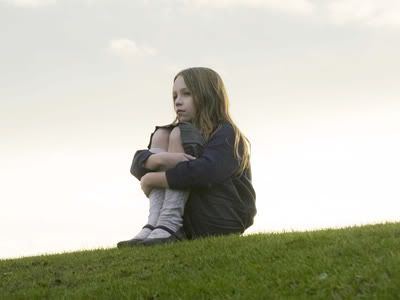
The Unloved
*UPDATE - 6/06/10* Congrats to Samantha Morton and co. for winning the 2010 Bafta award for best Single Drama
I caught this quite by accident late on TV last night. My curiosity was peaked seeing as it’s the first film directed by the excellent actress Samantha Morton and is also semi-autobiographical of her own early life in foster care and various children’s homes.
The Unloved tells of eleven years old Lucy (the excellent Molly Windsor) who’s been abandoned by her estranged mother (Susan Lynch) and then has to bear the brunt of her father’s (Robert Carlyle) violent anger. As a result she is placed in a grim, clinical, chaotic children’s home. We see all of this through Lucy’s eyes and watch as she struggles to cope with the cold, unfeeling, bureaucratic system while finding some limited comfort in her Catholic faith and the belief that she is being watched over and protected by God.
The main point of The Unloved is about how some children become lost and ignored within society and within the systems we supposedly create to help them, systems where getting one's expenses for petrol comes before attending to a lonely child. Systems that become more about the systems themselves than about what the actual individual child needs. Love. That’s all Lucy is seeking all the way through, to make a connection with someone and to feel loved and wanted. But the cold clinical world around her only isolates her more, while no adult, no person of authority will properly answer that most simple of questions she keeps asking: "Why can't I live with my mummy?" Which can also be interpreted as: "Why doesn't anyone love me?" Towards the end of the film she finally manages to ask her mother directly: “Can I live with you?” To which her mother has no proper answer, being too caught up in her own issues. The film ends with Lucy being sent back to the children’s home by her mother. The last shot is of the little girl sat on the bus, alone, staring blankly around before looking deep in to the camera lens pulled up tight on her face. It is a long unbroken take lasting several minutes. It is directly challenging the audience to look at her, to face the reality of the life many children like Lucy are forced to lead. To do better for them.
Films like this are not fun, nor do they make for particularly pleasant viewing. They usualy don’t have a happy ending. But they are important. Not all films should be escapist entertainment with pat resolutions and happy ever afters. We have an almost endless supply of those. And thank God for them. But some films should raise social issues; should ask important questions; should reflect the real lives of others; should challenge us to do something to improve things for those less fortunate. The Unloved is one such film. And I was impressed with the job Samantha Morton did with it. Some people have compared her approach and style to that of Ken Loach or even Shane Meadows. But it really isn’t. It is far more reminiscent visually and artistically of Asian cinema (Japanese or Korean) while also being rather Kubrick-like too. Although the grim subject matter lends itself to the likes of social realists such as Loach and co. and the excellent acting is of that same naturalistic method, Morton has instead attempted to create something different. This is a film that tells its story and highlights its issues and themes and makes its emotional and social points in a mainly visual manner with limited dialogue. There are long, steady takes and long scenes where nothing is said, with only images and sounds and sometimes music. Lucy is constantly absconding from the chaotic children’s home she’s been placed in, journeying around the city, searching for what she needs. The often-handheld camera chaos of the home contrasts wonderfully with the imagery of the world outside. The wide, soulless, motionless cityscapes, the big empty grey skies, the huge monolithic buildings that dwarf the child, the dark abandoned tunnels she must travel through. The most beautifully shot scene in the film is the graveyard where Lucy goes and plays alone under the trees amongst their fallen blossom, a place where she seems happy and that is a link to her faith, something which is a constant theme. While in the graveyard she sees a deer casually grazing amongst the headstones. So she just sits down and watches it, perhaps feeling kindred with the animal, both of them getting something of what they need in the most unlikely of places. There is a strong fairytale vibe in all of this: a child figuratively or literally lost in the world; isolation and loneliness; adults as potentially dangerous or just plain unfeeling figures; the quest for love and for belonging. Pan’s Labyrinth did something similar in a fantasy form as did the amazing Let The Right One In. Even new Doctor Who is now riding the same train.
Hey, what can I say? I’m a total sucker for this stuff. It’s my thematic nirvana.
The Unloved may not be perfect, but, overall, it is a very well made, heartfelt and affecting little film that largely achieves what it sets out to achieve. So I say well done to Samantha Morton. 4/5
Trailer:
The Unloved on 4onDemand

No comments:
Post a Comment